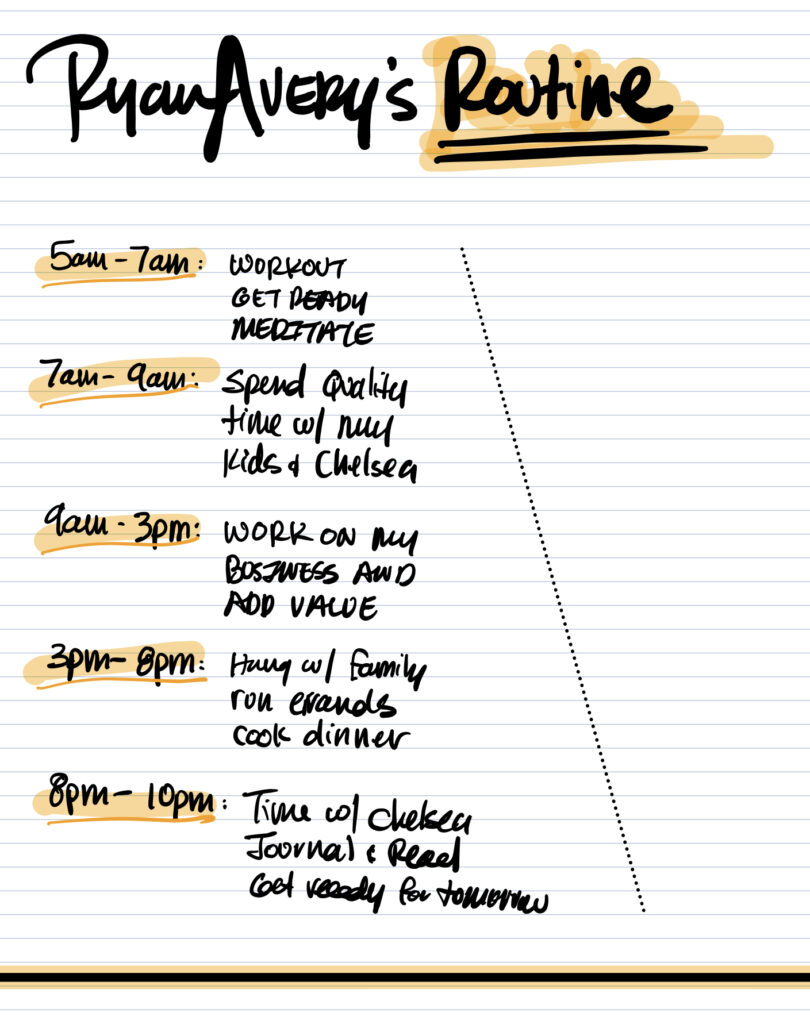








 Why should we have a routine?
Why should we have a routine?Action Items of the week: #1 Think about who you want to be vs what you want to do and #2 Come up your routine around the PPP.

So you need help being more productive and finding ways to increase your productivity? You and me, both! Wouldn’t it be great if we had four or even three more hours in the day? Better yet, wouldn’t it be nice to only need four or three hours of sleep each night so you could do more!
Well, we only get 24 hours in a day and for those of us who would like to be more productive with our time, here are five ways to increase productivity:
Complete things in threes. Write down
Do a time audit. The first thing I make my clients do is a time audit. I want to see– and I want them to see–how they are spending their time. It is crazy how much time people spend on social media, Hulu, Netflix, and lounging around. See how much time you can save in the week by being more productive. I am all for social media, Hulu, and lounging around, but maybe you are doing it too often or too much!
Block out time for time-wasters. Instead of taking time everyday to plan your meals or what clothes you are going to wear, take time at the end of each week to plan them out and get them ready. Schedule your email, keynote practice, social media, and TV consumption. Don’t check and respond to email throughout the entire day. Block out time in the morning and at night to do them rather than being interrupted on a regular basis.
De-clutter your work space. Stop letting your office space get in the way of what you need to accomplish. If you have paperwork you need to file, letters you need to write, bills you need to pay or things you see you need to do, clutter can stop you from being productive and fully engaged with the work at hand because it lingers in your mind.
Turn off that thing you still call a phone. Its buzzers, whistles, alerts, and photos comprise of a ticking time bomb to distract you. Put your phone on airplane mode when working and see how productive you really are.
Take time to incorporate one or more of these five things this week and see how much more productive you will be! As always…
Dream BIG,
Ryan

There is this feeling I get sometimes when I think, “Wow, that person is way better at that than I am.” Instead of getting angry or upset I do one of four things, and you may want to try these, too:
Reach out to them. Reach out and see what you can learn from them. Who knows? They might give you insight, advice, or strategies to become better. I can’t tell you how many people I have emailed or called and asked them how they do something and they just gave me the answer!
Copy them. If you find something they are doing that you like or that you know you could do better, copy them! Who is to say you can’t do it better?
Follow them. I utilize my lists on Twitter, adding people who are better than me to lists like “Speakers” or “Leaders” or “Mentors” so I can see what they are doing and how I can improve.
Share Them. Share with others what they are doing and why they inspire you. Show them that you are following them and you like their style!
People are not better than you; they are just bigger than you (with their reach). If someone else is doing something, that means you can do it also. Keep pushing yourself to new limits and as always…
Dream BIG,
Ryan

Last Monday, my aunt passed away. My cousins lost their mom, my uncle lost his wife, and my Aunt Becky and mom lost their sister.
Death hasn’t occurred too much in my family. I am not a religious person, so I can’t say with certainty what happens after this life. But what I can say, what I am reminded of when someone we love leaves this earth, is that we should live life before we die. Here’s how…
Soak up Your Family. How much time are you spending with those you love?
Fall in Love. What are you doing to make more room for love in your heart?
Smile More. How much do you smile?
Travel Often. Where in the world do you want to go? Go there!
Share Your Feelings. Don’t hold them in. Share what you feel and believe!
Take a Break. Take time to breathe in the air and really see your surroundings. Give thanks for what you have!
Live Your Life, Not Someone Else’s. Are you living the life that is true to you?
Create a Bucket List. What do you want to do before you die?
Actually Start Your Bucket List. What are you doing to check things off the list?
Volunteer More. How do you give back on a regular basis?
Make Money but Don’t Let it Consume You. Money gives us options, but are you too consumed with it?
Be Adventurous. When is the last time you have done something adventurous and fun?
Create Something That Helps Others. What are you doing to offer your talents to the world? Will the world be better off once you leave?
Dream… Then Go After Them. Please, please dream! The world belongs to those who dream and take action! The bigger your dream, the more you give the world! So please, please dream!
There is a saying that, “Everyone wants to go to heaven, but no one wants to die!” I don’t know what the next life will look like, but for now I want you and me to live our lives before we leave this earth!
I want more people to have fun, enjoy family time, and work to accomplish something bigger than themselves! Live life, live today, and as always…
Dream BIG,
Ryan